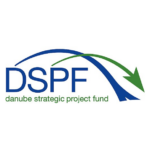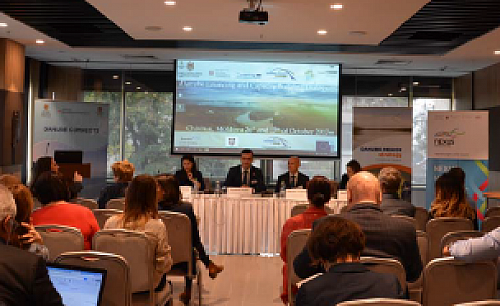DANUBE FINANCING AND CAPACITY BUILDING DIALOGUE: HOW DO WE MAKE FINANCING FOR DEVELOPMENT WORK?
Project funding is one of the major instruments of regional development. Hence, stakeholders responsible for strengthening regional development and for implementing the actions and targets of macro-regional strategies, often assess the contribution and shortcomings of funding. Especially, we discuss cooperation between EU member countries and non-EU member countries in the macro-regions, we are confronted with the challenge of different access to EU funding. However, successful regional development needs more than simply higher amounts of EU funding.
DANUBE FINANCING AND CAPACITY BUILDING DIALOGUE
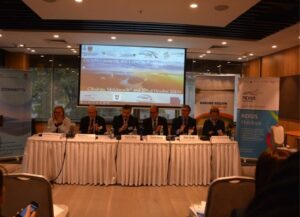 Priority Area 10 “Institutional Capacity and Cooperation” planned to develop a “Donors’ Conference Framework” in cooperation with further partners in the Danube Region. The framework should address better coordination of funding provided by public and private donors, furthering cooperation and trust between public authorities, civil society and local actors as well as increasing knowledge on how to use available funding in a more effective way. Thus, Priority Area 10 “Institutional Capacity and Cooperation” introduced the first Danube Financing and Capacity Building Dialogue as a pilot initiative in cooperation with the Ministry of Agriculture, Regional Development and Environment of the Republic of Moldova and Foster Europe in Chisinau from 26th to 27th of October 2017. Vasile Bitca (Minister at the Ministry of Agriculture, Regional Development and Environment) welcomed the initiative and highlighted the importance for an integrated approach for regional development.
Priority Area 10 “Institutional Capacity and Cooperation” planned to develop a “Donors’ Conference Framework” in cooperation with further partners in the Danube Region. The framework should address better coordination of funding provided by public and private donors, furthering cooperation and trust between public authorities, civil society and local actors as well as increasing knowledge on how to use available funding in a more effective way. Thus, Priority Area 10 “Institutional Capacity and Cooperation” introduced the first Danube Financing and Capacity Building Dialogue as a pilot initiative in cooperation with the Ministry of Agriculture, Regional Development and Environment of the Republic of Moldova and Foster Europe in Chisinau from 26th to 27th of October 2017. Vasile Bitca (Minister at the Ministry of Agriculture, Regional Development and Environment) welcomed the initiative and highlighted the importance for an integrated approach for regional development.
BETTER ALIGNMENT OF FUNDS
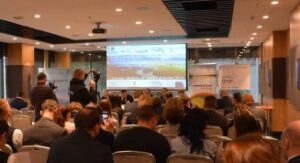 The EU Strategy for the Danube Region aims at bridging the development gap between EU and non-EU members. This objective is also highlighted in the Association Agreements between the European Union and its Neighbouring countries.Oxana Paierele (Ministry of Agriculture, Regional Development and Environment, MD) provided a brief glimpse on the landscape of EU funding available for the Republic of Moldova. Although the EU Neighbouring countries are participating in several EU funding structures, they apparently have less access to the Union’s funding compared to EU members. However, donor organisations such as the Austrian Development Agency (ADA), GIZ, Swedish International Development Cooperation Agency (SIDA) address capacity building in the Neighbouring countries in order to boost regional development.Alexander Karner (Austrian Development Agency) presented the project “Danube connects” that supports the Moldavian public administration to create the institutional and legal framework for the coordination and implementation of the EUSDR as well as cross border and transnational programmes (INTERREG). With this initiative, the Republic of Moldova is supposed to fully participate in these EU programmes and provide sufficient support to potential project promoters.
The EU Strategy for the Danube Region aims at bridging the development gap between EU and non-EU members. This objective is also highlighted in the Association Agreements between the European Union and its Neighbouring countries.Oxana Paierele (Ministry of Agriculture, Regional Development and Environment, MD) provided a brief glimpse on the landscape of EU funding available for the Republic of Moldova. Although the EU Neighbouring countries are participating in several EU funding structures, they apparently have less access to the Union’s funding compared to EU members. However, donor organisations such as the Austrian Development Agency (ADA), GIZ, Swedish International Development Cooperation Agency (SIDA) address capacity building in the Neighbouring countries in order to boost regional development.Alexander Karner (Austrian Development Agency) presented the project “Danube connects” that supports the Moldavian public administration to create the institutional and legal framework for the coordination and implementation of the EUSDR as well as cross border and transnational programmes (INTERREG). With this initiative, the Republic of Moldova is supposed to fully participate in these EU programmes and provide sufficient support to potential project promoters.
Besides capacity building for better implementation of EU programmes, different funding sources could also be used to finance different project components or follow-up initiatives. Further representatives from funding institutions such as Antonio Castillo (European Investment Bank, EIB), Marius V. Niculae(Danube Transnational Programme, DTP), Aurel Lozan (Global Environment Facility, GEF), Tatiana Udrea(State Chancellery, Cross Border Cooperation Office), Valeria Ieseanu (United Nations Development Programme, UNDP) presented different instruments that could be used in a complementary way. Combining and aligning different funding sources requires another essential factor for effective regional development: strategic planning.
STRATEGIC PLANNING
Assessing needs for development is an essential first step for progress. This allows for setting priorities for funding and facilitates a focussed search for suitable funding sources. A pre-condition for a proper needs assessment is inclusive and participatory governance. Matija Derk (EU High‐Level Adviser) pointed out that despite the allocation of significant public funding, past policies failed to include regions in the planning process and thus failed to reduce regional disparities. Involving key stakeholders and communities in the process of regional planning contributes to a comprehensive assessment of needs, an increased ownership for development among stakeholders and viable solutions that are supported by the relevant target groups. Intensive collaboration between different administrative levels and stakeholders creates synergies that improve progress in regional development. Strategic planning also means integrated planning. Traditional institutional borders need to be overcome in order to facilitate collaboration and better coordination between policy sectors to avoid duplication of work and resources or mutual hampering of activities. Anna Gherganova (Coordinator of Priority Area 9 “People and Skills”) highlighted the importance of including as much stakeholders as possible in order to have a resilient base for regional development. Thus, it is important to initiate and maintain a dialogue between partners of regional development and the macro-regional strategies.
BUILDING TRUST
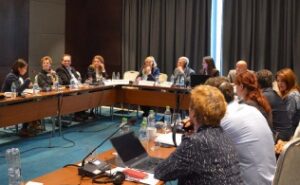 One of the big challenges in the Danube Region is the lack of trust and knowledge between and within different groups of stakeholders. A dialogue is the pre-requisite for building mutual trust and gathering knowledge at all levels. Trust provides the base for stable and viable collaboration between partners and mutual understanding of strengths and challenges. Valentin Ciubotaru (BIOS), Stefan August Lütgenau (Foster Europe/Danube Civil Society Forum) and Franz Tödtling (University of Economics and Business, Vienna) moderated working groups on sustainability, inclusiveness and growth, reflecting on different initiatives that require collaboration between different stakeholder groups. The initiatives proved that trust is a crucial factor for the success of projects and their continuation. Additionally, it is essential to include more partners in the process, which still may be challenging due to the lack of skills and capacities regarding (international) project management.
One of the big challenges in the Danube Region is the lack of trust and knowledge between and within different groups of stakeholders. A dialogue is the pre-requisite for building mutual trust and gathering knowledge at all levels. Trust provides the base for stable and viable collaboration between partners and mutual understanding of strengths and challenges. Valentin Ciubotaru (BIOS), Stefan August Lütgenau (Foster Europe/Danube Civil Society Forum) and Franz Tödtling (University of Economics and Business, Vienna) moderated working groups on sustainability, inclusiveness and growth, reflecting on different initiatives that require collaboration between different stakeholder groups. The initiatives proved that trust is a crucial factor for the success of projects and their continuation. Additionally, it is essential to include more partners in the process, which still may be challenging due to the lack of skills and capacities regarding (international) project management.
BUILDING CAPACITIES
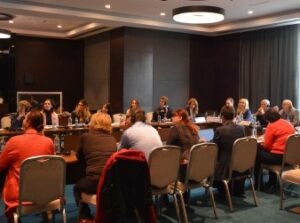 Building capacities for programme and project management is an essential factor for regional development. First of all public administrations need the capacities for strategic planning in order to set priorities and plan their supporting structures accordingly. In particular development agencies aim at supporting public authorities to increase their capacities accordingly. Additionally, Claudia Singer (Coordination of Priority Area 10 “Institutional Capacity and Cooperation”) presented the Danube Project Support Toolkit that provides useful know how to adapt or develop funding instruments that suits both, the funding objectives and the needs of beneficiares.
Building capacities for programme and project management is an essential factor for regional development. First of all public administrations need the capacities for strategic planning in order to set priorities and plan their supporting structures accordingly. In particular development agencies aim at supporting public authorities to increase their capacities accordingly. Additionally, Claudia Singer (Coordination of Priority Area 10 “Institutional Capacity and Cooperation”) presented the Danube Project Support Toolkit that provides useful know how to adapt or develop funding instruments that suits both, the funding objectives and the needs of beneficiares.
At the same time, potential project promoters need the capacities to develop and implement projects, set up partnerships and be able to look for suitable funding. This requires profound project management skills, a comprehensive knowledge about the funding landscape and sustainable partner networks. The Priority Areas of the EU Strategy for the Danube Region could be a valuable supporter as they are providing access to thematic networks and funding information in different thematic fields.
In his concluding remarks, Rudolf Schicker (Coordinator of Priority Area 10 “Institutional Capacity and Cooperation”) determines that there are manifold challenges for regional development in the non-EU member countries. Nevertheless, initiating the dialogue between public administration, civil society and local actors as well as exchanging knowledge is crucial first step that hopefully will lead to further collaboration.
The event was organised with support from Metis and financed by the Ministry of Agriculture, Regional Development and Environment of the Republic of Moldova, the Austrian Development Agency, Danube Transnational Programme, the City of Vienna and Foster Europe.
Danube Financing and Capacity Building Dialogue in Chisinau was a pilot initiative for the Donors’ Conference Framework developed by Priority Area 10 “Institutional Capacity and Cooperation”, based on the experiences of the Danube Financing Dialogue and the findings of the first National Participation Day in Chisinau in 2016.


